Kristy Franks
"I'm co-creating a documentary with Cree Youth."

Kristy Franks, a PhD candidate in the Department of Geography, Planning and Environment, received the Experiential Learning (EL) Grant to work on a project called Editing Collectively with Cree Youth for our Water Wonders Documentary Film. Ms. Franks has been working with a group of Cree youth from the First Nation of Wemindji, along with Jeremy Williams, a professional filmmaker from River Voices Productions. They are producing a video documentary that shares some of the findings from Kristy’s doctoral research. Prior to 2020, Kristy and the team engaged in field activities and video interviews in both Northern Quebec and South Australia. Throughout the past year, they have been editing the film and are currently in the final stage of consulting with everyone visible in it. They plan to launch it soon, and for the moment are happy to share the trailer which can be seen below.
The focus of the project is water and how water can bring people together in intercultural cooperation. In this respect, Kristy and those involved have been learning about different water-related concerns and about strategies for how to care for water access and quality. They have been working with Indigenous nations and non-Indigenous scientists from both sides of the planet (Canada and Australia) to learn from a diversity of sources and methods.
By expressing her work via film, Kristy has been able to practice self-awareness, self-direction, and taking initiative. Producing the documentary has been a substantial endeavour, requiring great coordination, preparation, and time management. By sharing the experiences with a group, she has further developed her skills in teamwork, leadership, and group reflection.


“The grant has enhanced not only my education related to the subject matter of my PhD, but has also allowed me opportunities to reflect deeper on the human interactions and skill development weaved into the experience. Moreover, the opportunity has contributed to benefitting my research partners and members of the group involved in the project. By engaging in this opportunity, the group and I have been able to learn about my PhD work experientially rather than just by me writing and publishing academic articles. Filmmaking has been an interactive way to practice community-engaged learning,” says Franks.
Franks and the participants have learned about water and culture cognitively from having meaningful focused discussions and performing interviews. They have learned affectively through activities like swimming, surfing, kayaking, scuba-diving, and participating in water ceremonies. They have visited water-related infrastructure including a hydro-electric dam in Northern Quebec and a desalination plant in South Australia. Moreover, they have learned about themselves in relation to water, given that human bodies are composed mostly of water. Through discussing which clips to include, and in which order, the Water Wonders team digested key messages and storylines together, and explored other points of view. The process fostered a reflective practice by deciding what to include in the film, as they were able to collectively deepen and expand upon what they had each learned individually.

“Furthermore, as the world is increasingly using online means to express ourselves, making the film has benefited all of us by having us practice skills related to digital tools. Via technology, we practiced decision-making and exercised how to articulate our newly acquired knowledge. Most of the video editing was done with digital video equipment, both in person (pre-pandemic) and online at a distance (because of COVID-19 restrictions). In turn, the editing phase has familiarized our group with innovative methods and technologies, and has shown us how to use such tools while creating projects, reflecting on our learning, and sharing knowledge” reflects Franks. “Thus, the practical skills that many of us have learned include using technical tools like video recording devices such as cameras, drones, and microphones, as well as editing tools like video-making programs and techniques. Applying these skills has provided us with an understanding for how technology can be used to contribute to knowledge mobilization.”
The content of the documentary shares wisdom, challenges, and practices related to water from a diversity of cultural worldviews. Just from sharing the film trailer, the project has already seen how the film has made ripple effects among communities interested in water protection. Especially when learning about water-related knowledge from different cultures, viewers can exercise empathy, deep listening, and appreciation for different realities and viewpoints.
Looking forward, some of the youth will be working alongside Franks on co-authoring an academic article focused on how film and editing can be tools for sharing knowledge and capacity building. The contents of the article will likely present an analysis on the learning points described above, for which the EL grant has been a key contributor.
This article was co-written by Emily Andrews and Kristy Franks.


